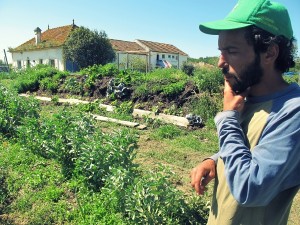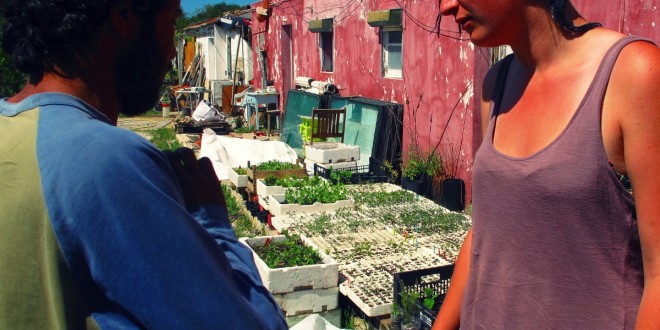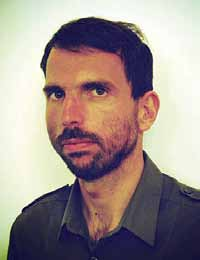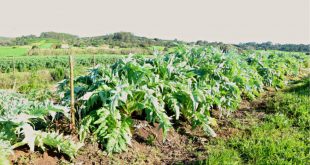It’s just a small step from organic agriculture to sustainable development
 Projecto 270 may be just a farm, but it is actually much more than that. It covers half a hectare and is located between the beaches of Praia da Riviera and Praia da Rainha on the Costa da Caparica. It’s been running for a decade and is organically certified. The idea for the project arose in Genoa at a demonstration against globalisation, putting into practice the motto “Think globally, act locally”. Its name comes from the number of the plot.
Projecto 270 may be just a farm, but it is actually much more than that. It covers half a hectare and is located between the beaches of Praia da Riviera and Praia da Rainha on the Costa da Caparica. It’s been running for a decade and is organically certified. The idea for the project arose in Genoa at a demonstration against globalisation, putting into practice the motto “Think globally, act locally”. Its name comes from the number of the plot.
To start with it was quite a sandy, family plot, but then it started being managed by Zélie and Nuno Belchior as a way of emulating a self-managing society. This is because Projecto 270, despite subsisting almost exclusively on what it produces, does not benefit from any support or subsidies. It operates purely through the efforts of its two managers, occasionally with some volunteers. It produces all the typical seasonal vegetables, as well as eggs, chickens, apples and figs. Although they sell part of their output that they do not consume,Nuno and Zélie also rely on bartering, and it is not unusual for them to exchange chicken for fish.
They also put the subsistence philosophy of organic agriculture into practice by reusing resources which would otherwise remain unused. One example is the 80 kilos of coffee they received, which were used to make the worm composting bin. Or the mackerel rejected by the fishermen which, because of the quantities involved, are used as fertiliser in agricultural land.
Part of the way they solved the problem of sandy soil was through composting (1). This involved reusing organic waste such as vegetable peelings, egg shells, coffee grounds, kitchen paper and newspaper, all based on the worm composting bin built by Nuno. By using this technique, they were able to create a layer on top of the original soil and overcame what would otherwise have been an insurmountable problem: infertility. Apart from the production of actual foodstuffs, the project is guided by a philosophy of food cures. They put this into practice by supplying specific plants, such as aloe vera, and teaching about their multiple applications.
Nuno, who has a degree in history, explains how he was in India before starting Projecto 270 as part of the Navdanya movement which is based there. The NGO promotes the conservation of biodiversity, organic production, the defence of farmers’ rights and seed saving. The four months during which he was part of the movement gave him the technical knowledge which he uses today. But the period also consolidated his philosophical and political foundations as he attended training programmes on natural methods of fertilisation and food production, as well as on civil disobedience and boycotts.
According to Nuno, “and as a form of participative citizenship, the project has developed not only agricultural production but also cultural work. We have organised initiatives such as courses on permaculture, conferences on food sovereignty and training programmes on the history of seeds.” At present, they also collaborate with the “Programa 21 Toneladas” (2), which aims to foster food sovereignty and biodiversity through family food production.
“Another way of using up our excess production, and also to earn a bit more, is to make meals that we sell, not only on the project’s own premises but also at national events,” Nuno Belchior explained.
Nuno believes that “farmers should unite around similar attitudes”. Through this, “they would be able to benefit from an educational programme about the harm of using chemicals”. This is because “there are effects on health and the environment, but they also have economic effects, in the long term on agricultural producers themselves,” he adds.
If there is one place in Portugal where organic farming is more than just producing food without using chemical products, that place is Projecto 270.
“The initiatives of Projecto 270 aim not only for organic farming to develop locally and in families, but also for food sovereignty and biodiversity”
“The project subsists almost exclusively on what it produces, without support or subsidies”
Estrada Florestal, nº 270, Costa da Caparica
Tel.: 914 082 318
Email: projecto270@gmail.com
Webpage: www.permaculturaportugal.ning.com/profile/projecto270
(1) Biological process for transforming organic matter into compost which can be used as fertiliser
(2) The “Programa 21 Toneladas” (21 tonnes programme) aims to create a link to a way of producing food based on natural cycles.
The aim will be to reach a total of 21 tonnes of organic matter through links with the economic activities in the parish, such as artisan fishing, educational establishments, shops and restaurants, and the general population.
 Eco123 Revista da Economia e Ecologia
Eco123 Revista da Economia e Ecologia



